Whittemore / Boston / U.S.A.
Whittemore / Boston // French Gloss
Whittemore Bros. & Company (later known as Whittemore Brothers Corporation), Cambridge, Massachusetts (1852-c. late 1930s?) was a large producer of shoe dressing and related products, launched in 1852 by David and Joshua Whittemore. (Cambridge is now part of the greater metropolitan area of Boston). The majority of older Whittemore bottles are marked with either of the two embossing variations “WHITTEMORE / BOSTON / U.S.A.” or “WHITTEMORE / BOSTON // FRENCH GLOSS”.
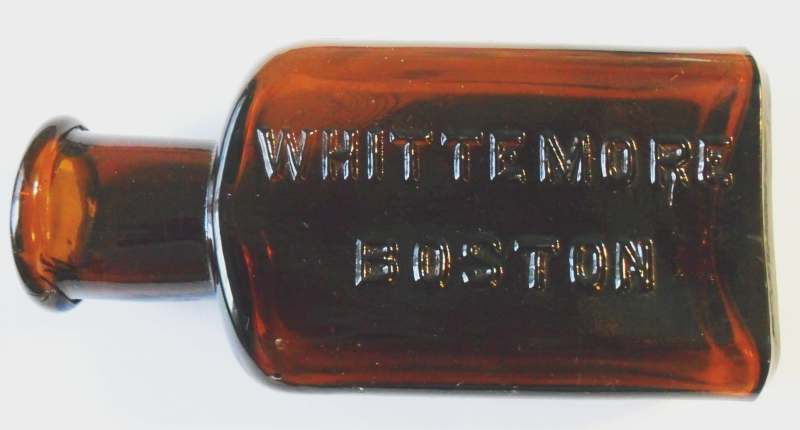
Most bottles with the “Whittemore” markings contained shoe polish (often called “shoe dressing”) and date somewhere between 1870 and 1930. There are a number of minor variations among the Whittemore bottles; most are of a rectangular shape, and some are cylindrical. They have been found in many colors, including aqua (the most common color), light blue aqua, green-aqua, clear, pale (sun-colored) amethyst, light green, shades of amber including a dark “chocolate amber”, and citron.
One of the earlier lines of shoe dressing sold by Whittemore was their so-called “Gilt Edge Dressing”, and some bottles from the 1890s are found with this embossing on the front. This decorative style of Gilt Edge Dressing bottle has a repeated Maltese-cross-style raised design vaguely reminiscent of the “Finecut” pattern popular in some Early American pattern glass tableware.
ADVERTISEMENT
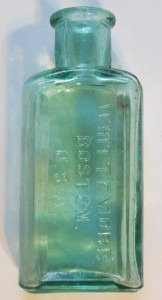
A nice collection of different Whittemore bottles can be assembled because of their variety in color, size, age, and exact lettering arrangement. Earlier versions, of course, are handblown. Most later versions (generally, after the 1910-1920 period), are machine-made.
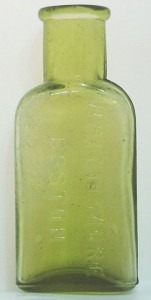
Although there is no absolute proof concerning glassmakers, I have been told that it is highly likely that some, if not many, of the earlier bottles were made at the Lyndeborough Glass Company works in South Lyndeboro, New Hampshire (1866-1888).
A number of unidentified glass bottle manufacturers made these bottles over the several decades they were produced.
Most of the earlier versions have mold numbers, or arrangements of raised bumps or dots on the base which served to identify the molds in use within the factory, but (in general) cannot indicate any specific glass manufacturer. There are many early Whittemore bottles that have no markings at all on the bottom.
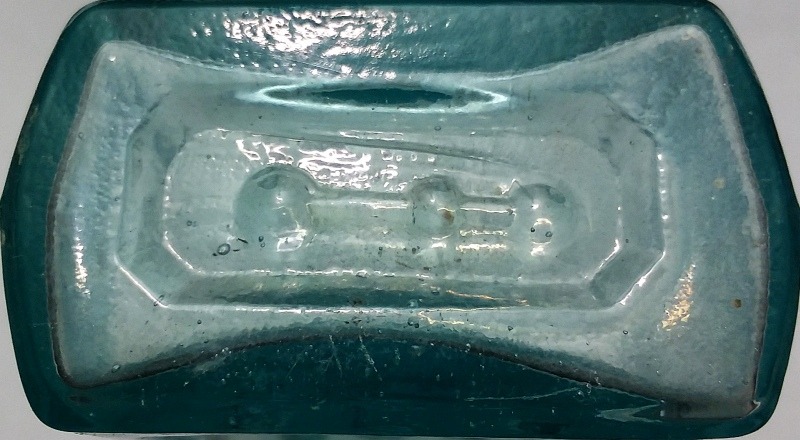
Here is a keyword search link for ebay listings with WHITTEMORE in the subject heading: Ebay Whittemore bottle search
For an extensive list of glass manufacturers’ marks seen on bottles, fruit jars, insulators, tableware and other items, please click here to go to the GLASS BOTTLE MARKS pages, page one.
Click here to go to my Home Page.
ADVERTISEMENT
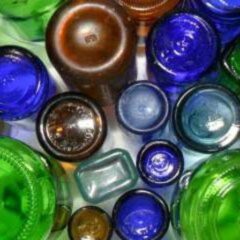

Not sure if this is the right place to be asking ….I got a cobalt blue Bromo seltzer bottle. On the bottom of it is the number 27, on the side it says Bromo Seltzer Emerson Drug co Baltimore.
Hi Steven,
My webpage on the Bromo Seltzer bottles is at this link: Bromo-Seltzer~Cobalt Blue Bottles~Brief History. The “27” on the bottom is a mold number and doesn’t tell us about the age of the bottle. Take care,
David
I have a clear Whittemore French Gloss 3oz bottle marked with the Hazel-Atlas mark, mold 7 on the bottle. My question is : Does the cork style top narrow down the production date of this bottle?
~Thanks in advance for any info
Hi Tom,
I don’t know what date range the cork-style bottles were made. But I would guess they were being phased out by sometime in the 1930s-1940s. Sorry I don’t have better info for you.
David
I found a partial bottle of French Gloss the bottom is missing. It has 3 Fluid Oz. on the top and looks like it had a cork top that went to it. Do you know about what year this was made?
I really appreciate the info you’ve shared!
My husband found one of these bottles in a light turquoise and iridescent sheen. No cork or numbers but there is a long dash on bottom of bottle. Does this help date this?
Hi Tami,
I think some of those raised lines, bumps or dashes seen on some of the Whittemore bottles served merely as mold identifiers, equivalent to a number or letter. I am assuming yours is an older type, handblown with a tooled lip.
I would guess that your bottle dates from sometime in the 1880-1920 time period. I know that doesn’t narrow it down much, but I really can’t be sure of pinpointing the dating on most of those bottles.
Take care,
David
I am a Whittemore. I have had two bottles given to me years ago. One is clear greenish with a 2 on the bottom and has a cork and swab in it. The other is more weathered, with two raised dotts on the bottom. No cork in that one. It’s fun finding this site.
My mother was a Whittemore from Dixfield, Maine. My grandfather was Bill Whittemore; there was 12 children in his family. I was told he was related to the Whittemore shoe polish company. Do you know of the oldest man in the American Revolution 1775 Samuel Whittemore. I have Whittemore shoe polish bottles & a 1898 postcard from Whittemore Brothers & CO. Address 237, 239, 241 & 243 Albany St. Boston Mass. sent to Halifax N S .
My father, raised in NY, had a tool, which my son now has, which was a combination hammer/hatchet with a forked top for removing nails. Tool is solid steel thought the handle with two wooden slabs/scales attached on either side. On one side it was marked “Iroquois” on the other side “Use Whittmore Shoe Polish” !
I know this site is re. bottle – but if you could suggest where I could find info on this tool, I’d really appreciate it. Thank You. Jim
Jim, I don’t know anything about the tool you describe. Perhaps someone will see your post and comment on it! Thanks for writing,
David
Sounds like a multitool made by Iroquois with some advertising added after
Sounds like a cobbler’s (shoemaker) hammer. probably Whittemore paid to have an ad on it. Seen one on an online auction. Fork was on the top, then a hammer/hatchet device down the shaft. On the one I viewed the metal twisted just above where the wooden sides were affixed.
I just found a WHITTEMORE BOSTON U.S.A. bottle with NO.1 stamped on the bottom. Does #1mold make it any more significant of a find?
Hi Gordon,
No, it is just a mold number which has no significance or impact on value. Many mold numbers were used over the years. A mold number “1” (one) doesn’t necessarily mean that it was the first mold used. It just means it was one of several molds within a particular “numbered mold set” being used during a particular period of time. There may be a number of different molds used throughout the years that happen to have the number “1” on them. This is true of many, many bottles and jars of various types and brands that have been made over the last 100 years or more. Hope this helps!
David
I have a shipping box from Whittemore it says 1 dozen Baby Elite Myg by Whittemore Bros&Co Boston,USA
I have a whittlemore Boston u.s.a. bottle with. 6 or a 9 on the bottom and states 5 fluid oz. However does not say shoe dressing on it anywhere.
Dawne, as far as I know, the WHITTEMORE bottles don’t have the actual wording “SHOE DRESSING” embossed in the glass. A paper label which would have originally been affixed to the bottles would have provided more information, including the brand and the words “Shoe polish” or “Shoe dressing” on them. Your example with the mold number on the base and the “5 fluid Oz” is one of the later versions, possibly from sometime in the 1910s-1940s.
~David
Thanks that is very helpful!!!
My bottle is rectangular; it say’s Whittemore’s Shoe Polish (you have to hold the bottle horizontally to read it). It has a very rusty screw cap, and just below it says 13/4 oz. It has the remnants of white polish inside. The bottle is clear. On the bottom it has L-8546 The letter A inside what looks like an upside down U and the #6 to the right of that. Any information year, value would be appreciated. Thanks,
Tom, that particular bottle was made by Hazel-Atlas Glass Company, judging from the mark you describe. Please check out my webpage on that company. The Whittemore polish bottles were made over many, many years and I cannot tell you what year your bottle was made. With a screw-type lid, it might date from the 1930s-1950s. The “L-8546” is a number that was probably assigned to that bottle mold (or style) by Hazel-Atlas. I prefer not to discuss values, but readers continue to ask me about them. The value to antique bottle collectors is very low, perhaps 50 cents to a dollar.
Best regards,
David
I found one quite similar to Tom’s. The only difference is that on the bottom it has “L-8540” and the number “7” instead of six. It still has a little bit of white polish left in it as well. I just found it today in my creek. It is in nearly perfect condition. Its really amazing. I thought it was a glass liquor bottle at first. 😂
I have a Whittemore bottle with the “B” in Boston without the final line in the “B” so it looks more like a “C”. Unique? We obviously know it’s supposed to be a “B” but still looks like a “C” to me. Found in a house built in Bethel, CT. in the 1880’s. Thanks, dan
Dan, you have an example of a mold-making error. I don’t know how common that variant is.
~David
David, thanks for your response. Any idea of who the expert on Whittemore is? dan
Dan, I don’t know, but you might try posting queries on the http://antique-bottles.net discussion website, where lots of bottle collectors hang out. There may be some Whittemore specialists there who can shed more light on the bottle.
Best regards, David
I have one with the number 21 is this an original just wondering.
Julia,
I don’t know of any Whittemore bottles being reproduced. Many slightly different mold varieties are known and, in general, Whittemore shoe polish bottles are considered to be very common by collectors. I am sure you have an authentic Whittemore bottle. The “21” would be a mold number.
Best regards,
David